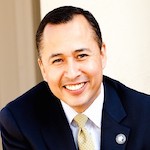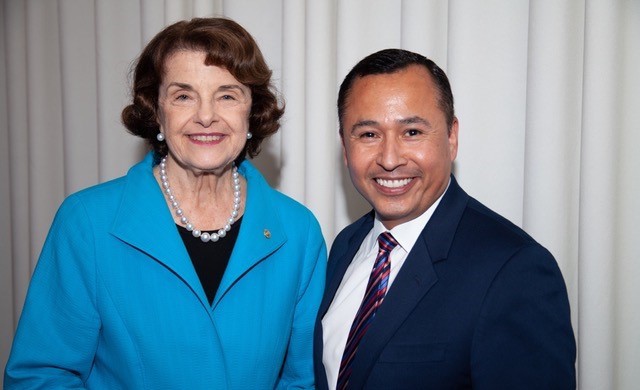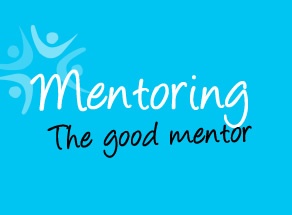
A Voice for Patients and an Advocate for Meaningful Healthcare Change
12/27/2019 06:00AM | 3709 viewsby Kim Perez
If you thought it was hard to keep track of healthcare rules and plans for yourself and your family, just think how complex it is for someone whose job is to track all legislation and policy changes at the federal, state, and local levels – for an entire healthcare institution.
That’s what Luis López does as director of government affairs for City of Hope, a world leader in the research and treatment of cancer, diabetes, and other life-threatening diseases.
“We live in a dynamic environment related to healthcare – regulations and policies are always evolving,” said López. “Our purpose is to stay on top of that, be prepared, react accordingly, appropriately, and strategically – so that our voice is used to protect our patients and the delivery of care.”
He advocates for policies that will have a positive impact on patients and healthcare delivery, by helping lawmakers better understand what patients need in order to access quality care – and what healthcare providers need in order to continue delivering quality and compassionate care to those who seek it.
At the federal level, López monitors and responds to Congressional action on a variety of issues that affect patients and doctors. He provides input about how suggested policies will impact the delivery of care, people’s access to care, and how care is paid for. He also tracks the federal budget and funding for research of cancer, diabetes, and other diseases that affect City of Hope patients and families. At the state level, there are hundreds of bills introduced in any given year – and López and his team monitor all legislation related to healthcare.
All of these policy decisions can have an impact on the lives of patients – for example, right now there’s a lot of discussion of what to do about the high cost of pharmaceuticals.
“I am the voice for patients, helping lawmakers understand how their decisions impact patients and the health professionals who are delivering their care,” he said. “But I don’t work alone, and City of Hope doesn’t work alone. We coordinate and work with many different organizations. We have more impact if we’re part of a group of people working together.”
A Healthcare Advocate From the Start
López has been speaking out for healthcare for the past two decades. He got involved through a job early in his career as a community health outreach worker, and progressed into leadership roles advocating for care for people living with HIV/AIDS.
“It was the height of the HIV/AIDS epidemic, and it was very concerning because I had many friends with HIV,” he said. “It was hard not to get involved. During that time, we built programs and organizations to advocate, create awareness, and engage people in improving and protecting their own care. I learned a lot about public policy, and about what the government can do to address an epidemic.”
López wanted a more formal education about how policy works. He earned a master’s degree in public policy from Harvard University’s Kennedy School of Government. Studying leadership, economics, policy, statistics, and analysis – he came away with a deeper understanding of how policy is made.
“Going through that degree program gave me formal training and the tools to understand how I can use that training in my work,” said López. “That positioned me to come back and develop a career merging my healthcare background and also the policy and government affairs work.”
After getting his master’s, López spent 12 years at AltaMed Health Services, California’s largest nonprofit network of community health centers. He held a variety of positions in HIV/AIDS advocacy and policy, communications and media engagement – ultimately serving two years as the organization’s director of government relations. In 2015 he joined City of Hope as director of government affairs.
Cancer is Unique
While cancer is not City of Hope’s only focus, it’s a disease with unique attributes that López wants policymakers to understand and acknowledge.
“We often accomplish incremental gains, but the big thing on my wish list would be to have healthcare delivery systems treat cancer care delivery in a way that appreciates the unique characteristics of this disease,” said López. “It’s different from any other disease state. We have incredible innovation and science developing and changing daily. But a challenge is the overall healthcare system that is organized in a way that treats all disease states similarly.”
He wants those who shape the policy and economics of healthcare to understand that cancer is not treated in the same way as a heart condition or a broken leg. Cancer is now recognized not as one condition, but as multiple conditions. With the emergence of genomic sequencing technology, cancer may soon be viewed as potentially hundreds of conditions.
Payment systems should reflect those differences.
“A different genetic makeup could require a different therapeutic approach,” said López. “There are many variations of cancer, and that makes it complex. We need a different way to think about it and a different way to organize payment systems.”
That’s part of what López advocates for – not just for cancer, but for any policies that affect patients, health care professionals, and how the care is received and delivered.
“I love that I get to use my voice to help make change that will be meaningful to patients and families,” said López. “Being able to have a role in that is what I enjoy most about my job.”
His advice for those who aren’t yet sure what they want to do, is to just be curious, start where you are with whatever interests you, and move toward it. Find people you can learn from.
He started with curiosity and certainly is happy about where he’s arrived today.
“City of Hope is such a tremendous institution, and it’s great place to be if you want to be challenged and continue to develop yourself and be able to do that while having a positive impact on patients,” said López. “Day in, day out, I hear so many stories about survival and resilience. It’s so inspirational and makes me want to help people.”






Post your Comment
Please login or sign up to comment
Comments